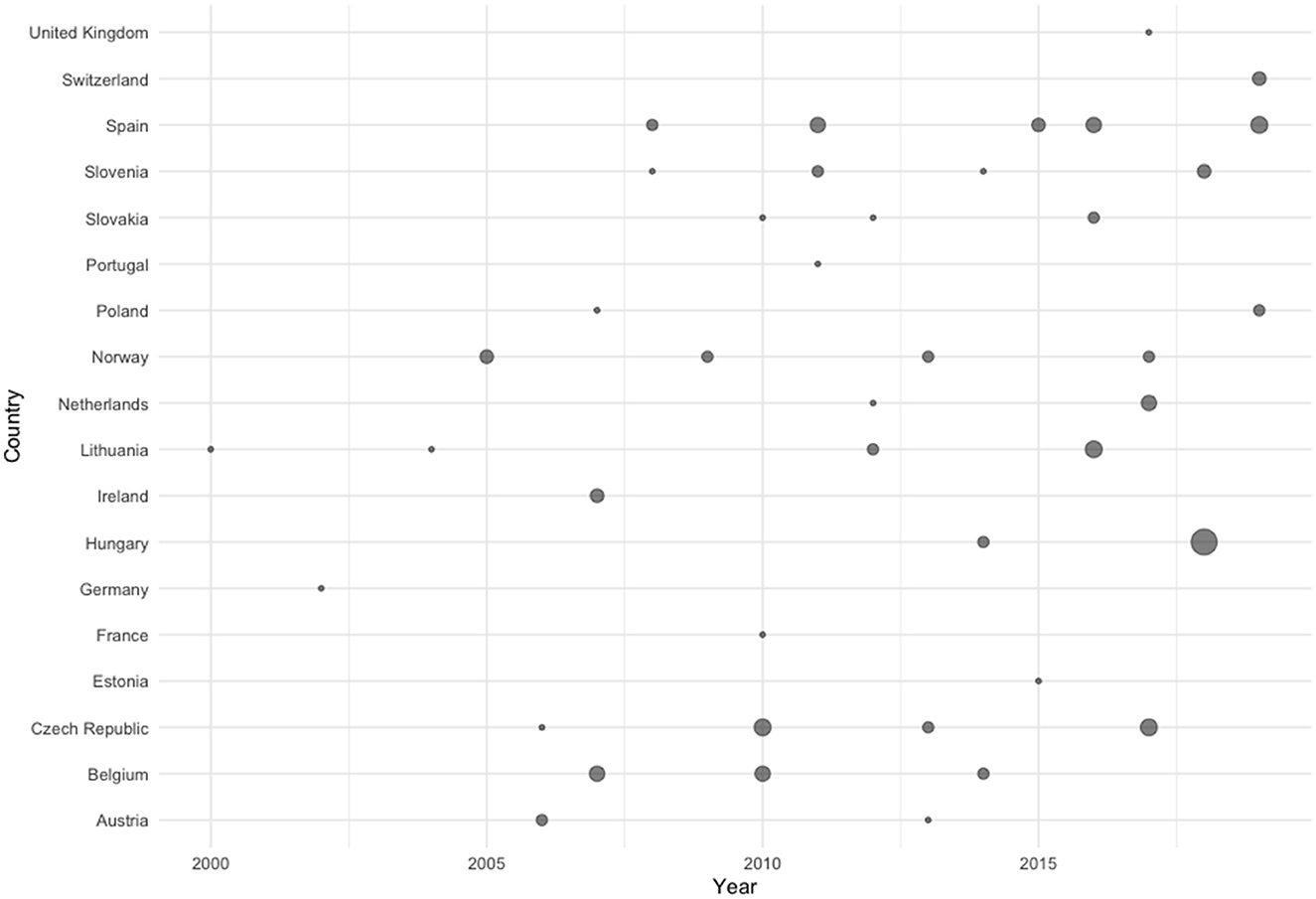
95% of researchers rate our articles as excellent or good
Learn more about the work of our research integrity team to safeguard the quality of each article we publish.
Find out more
CORRECTION article
Front. Polit. Sci. , 27 June 2023
Sec. Elections and Representation
Volume 5 - 2023 | https://doi.org/10.3389/fpos.2023.1230397
This article is part of the Research Topic Party Positions on Electronic Voting View all 5 articles
This article is a correction to:
Debating E-voting throughout Europe: constitutional structures, parties' concepts and Europeans' perceptions
A corrigendum on
Debating E-voting throughout Europe: constitutional structures, parties' concepts and Europeans' perceptions
by Borucki, I., and Hartleb, F. (2023). Front. Polit. Sci. 5:982558. doi: 10.3389/fpos.2023.982558
In the published article, Figure 1 was mistakenly not included in the publication. The missing Figure and its caption appear below:

Figure 1. Clustered distribution of mentions of E-voting in party manifestos over years; own calculation, data from Manifesto project (Merz et al., 2016).
In the published article Figure 1 is now shown as Figure 2 and an in text citation has been added. A correction has been made to Results, paragraph 8. This sentence previously stated:
“Thus, two scenarios were tested with logistic regressions where needed variables were available: First, we set preferences for E-voting were set as the dependent variable, putting in being an expat as the independent variable, together with the country of residency, the available technology (landline, mobile phone, and Internet), and sociodemographics (sex, age, and education).”
The corrected sentence appears below:
“Thus, two scenarios were tested with logistic regressions where needed variables were available (see Figures 2A–C): First, we set preferences for E-voting were set as the dependent variable, putting in being an expat as the independent variable, together with the country of residency, the available technology (landline, mobile phone, and Internet), and sociodemographics (sex, age, and education).”
The authors apologize for this error and state that this does not change the scientific conclusions of the article in any way. The original article has been updated.
All claims expressed in this article are solely those of the authors and do not necessarily represent those of their affiliated organizations, or those of the publisher, the editors and the reviewers. Any product that may be evaluated in this article, or claim that may be made by its manufacturer, is not guaranteed or endorsed by the publisher.
Keywords: E-voting, Eurobarometer data, party manifesto data, democratic innovation, Europe, European Union, EU
Citation: Borucki I and Hartleb F (2023) Corrigendum: Debating E-voting throughout Europe: constitutional structures, parties' concepts and Europeans' perceptions. Front. Polit. Sci. 5:1230397. doi: 10.3389/fpos.2023.1230397
Received: 28 May 2023; Accepted: 09 June 2023;
Published: 27 June 2023.
Approved by:
Frontiers Editorial Office, Frontiers Media SA, SwitzerlandCopyright © 2023 Borucki and Hartleb. This is an open-access article distributed under the terms of the Creative Commons Attribution License (CC BY). The use, distribution or reproduction in other forums is permitted, provided the original author(s) and the copyright owner(s) are credited and that the original publication in this journal is cited, in accordance with accepted academic practice. No use, distribution or reproduction is permitted which does not comply with these terms.
*Correspondence: Isabelle Borucki, aXNhYmVsbGUuYm9ydWNraUB1bmktbWFyYnVyZy5kZQ==
Disclaimer: All claims expressed in this article are solely those of the authors and do not necessarily represent those of their affiliated organizations, or those of the publisher, the editors and the reviewers. Any product that may be evaluated in this article or claim that may be made by its manufacturer is not guaranteed or endorsed by the publisher.
Research integrity at Frontiers

Learn more about the work of our research integrity team to safeguard the quality of each article we publish.